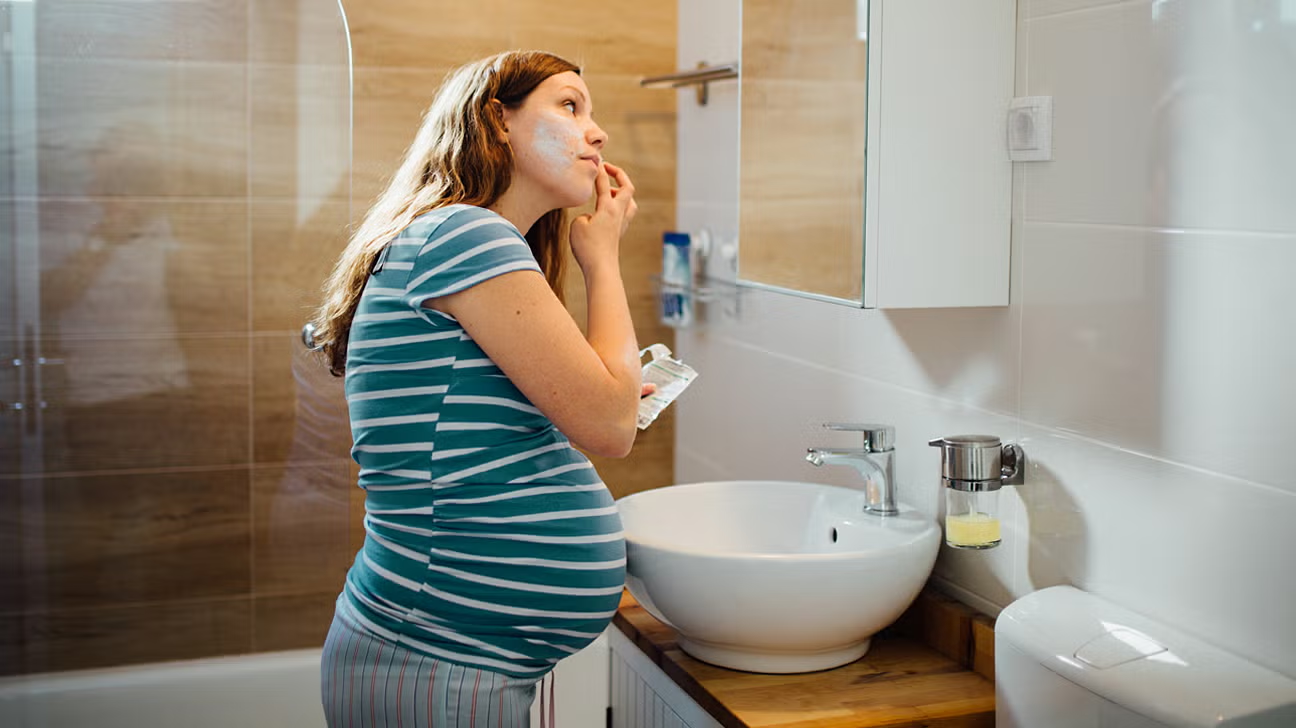Skin Changes During Pregnancy
Pregnancy-related skin changes are common and often linked to hormonal shifts, immune system changes, and changes in cardiovascular function. While some people enjoy glowing skin throughout their pregnancy, others may face challenges like:
- Dry skin
- Darkening skin (melasma or chloasma)
- Acne outbreaks
Additionally, pre-existing conditions like eczema, psoriasis, or rosacea may worsen or improve. Pregnancy can also bring about changes in hair growth, stretch marks, and spider veins.
Top Skin Care Ingredients to Avoid in Pregnancy
While most over-the-counter skin care products are safe, there are certain ingredients that should be avoided during pregnancy to protect both you and your baby. Here are some key ingredients to watch out for:
Retinoids
Retinoids, commonly used for acne and anti-aging, are derived from Vitamin A. Though topical products contain lower doses of retinoids, prescription medications like isotretinoin have been linked to birth defects. For this reason, all retinoids are generally advised against during pregnancy.
High Dose Salicylic Acid
Salicylic acid is often used to treat acne, but high doses (such as those in peels and oral medications) should be avoided. Low doses in OTC products are considered safe, but it’s best to consult your doctor.
Hydroquinone
This ingredient is used for skin lightening but should be avoided in pregnancy due to the potential for significant absorption. It’s safest to limit exposure during pregnancy.
Phthalates

These chemicals, found in many cosmetics, are known endocrine disruptors. Exposure to phthalates has been linked to reproductive and developmental issues in animal studies, so it’s best to avoid them during pregnancy.
Formaldehyde and Formaldehyde-Releasing Agents
Formaldehyde is a known carcinogen, and some beauty products still contain formaldehyde-releasing chemicals, which can potentially increase the risk of infertility or miscarriage.
Chemical Sunscreens
Chemical sunscreens containing oxybenzone and related compounds may disrupt hormones. They have been linked to various health concerns, including birth defects and developmental issues, and should be avoided during pregnancy.
Safe Skin Care Ingredient Alternatives
You can still care for your skin safely during pregnancy. Here are some pregnancy-safe alternatives:
For Acne and Hyperpigmentation
Instead of retinoids, try glycolic acid or azelaic acid, which are safe for pregnancy and can help with acne and pigmentation. Benzoyl peroxide and low-dose salicylic acid are also considered safe by experts.
For Mature Skin and Wrinkles
Topical antioxidants like Vitamin C, Vitamin E, and green tea can protect your skin and reduce the effects of aging. These ingredients are safe and effective during pregnancy.
For Dry Skin and Stretch Marks
To combat dry skin and prevent stretch marks, use moisturizers with ingredients like coconut oil, cocoa butter, peptides, and hyaluronic acid. Regular hydration will keep your skin soft and supple as your baby grows.
For Sun Protection
Instead of chemical sunscreens, opt for mineral-based sunscreens containing zinc oxide and titanium dioxide. These ingredients provide excellent UV protection without the risks associated with chemical filters.
Pregnancy-Safe Skin Care Brands
Several brands specialize in pregnancy-safe skin care products. These include:
- Belli Skincare
- Earth Mama® Organics
- Erbavia Organic Skincare
- The Spoiled Mama
- BeautyCounter
How to Check if Your Skin Care Products Are Safe
To ensure your products are pregnancy-safe, consult your dermatologist and OB-GYN, especially if you’re using prescription medications or have pre-existing skin conditions. You can also check the ingredients in your products using credible resources like the Environmental Working Group (EWG). They offer a database with safety ratings for over 87,000 personal care products.
Try This Pregnancy-Safe Day and Night Skin Care Routine
To make things easier, here’s a simple skin care routine for pregnancy:
Morning Routine:
- Cleanse with lukewarm water and a mild, pregnancy-safe cleanser.
- Apply a serum (if desired).
- Moisturize with a product suited to your skin type.
- Apply an eye cream (optional).
- Finish with a broad-spectrum mineral-based sunscreen to protect your skin.
Night Routine:
- Cleanse your face with a mild cleanser.
- Apply a pregnancy-safe serum.
- Moisturize to keep your skin hydrated overnight.
- Use a rich moisturizer on your belly, hips, and thighs to prevent stretch marks.
The Takeaway
While it may be challenging to let go of some of your favorite skin care products, your baby’s health should always be a priority. By avoiding certain ingredients and using pregnancy-safe alternatives, you can maintain healthy, glowing skin throughout your pregnancy.
Also Read : Best Ingredients for Anti-Aging Skincare: What Really Works



